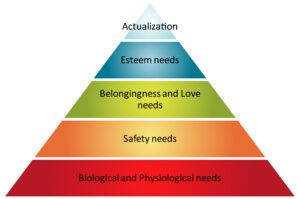Your Employee’s Psychological Needs—and What They Mean for Your Hiring Process

At the most basic level, every organization is made of people. They may be highly skilled professionals, but they are also human beings with their own physical and psychological needs. Ignoring these needs leads to an unmotivated and unengaged work force. Making efforts to meet these needs in the workplace gives you the best chance to get the best work out of your people.
You may have heard of Maslow’s hierarchy of needs. This is a description of the five main needs people have in order to function at their best and most productive. The five major needs are, physiological well-being, a sense of safety, feelings of love and belonging, esteem (including both self-esteem and esteem from others), and self-actualization.
Maybe you think it’s not your job to worry about the psychological well-being of your employees. People may have their psychological needs, but in the workplace it’s their job to be professionals who get things done. If that’s what you’re thinking, you’re right. However, it’s still worthwhile for you to consider these needs in your workplace and hiring process.
Why? We’ll talk about that in a minute. For now, let’s get into the specifics of your employee’s psychological needs and how they affect your organization.
The Hierarchy of Needs
- Physiological Needs
Physiological needs cover the things people need in order to keep going. This includes the most basic human needs, such as food, clothing, and shelter. Many of your employees are working for you because they want to have these needs met. In fact, these needs are so basic that it’s easy to forget how very important they are.
A business that doesn’t at least provide for the physiological needs of its employees can assume those employees won’t be very engaged. People who are struggling to make ends meet can’t be expected to do the kind of creative and strategic work it takes to run a successful business.
- Safety
Once people have their basic physiological needs met, the next thing they need is a feeling of safety. This includes physical safety. Even in lines of work where employees routinely face potentially dangerous situations, they need to know safety guidelines and procedures are in place in case anything goes wrong.
Safety means physical safety, but it also includes things like job security. People aren’t going to be at their best in an environment where they feel like one wrong word spoken to the wrong person might get them fired. Employees are more likely to remain loyal to an organization where they can feel secure.
- Love and Belonging
At a first glance, it might seem like love and belongingness are very real human needs, but not ones that have much to do with the workplace. And in a way this is true, there aresome loving and emotional needs that don’t belong in the workplace.
That being said, it’s worthwhile to create a work environment where employees feel like a valued member of the team. Creative synergies happen when people from different backgrounds come together as a community. If you can create a work environment where everyone feels a genuine connection to the team and its members, your results will be much greater than if your organization were only a group of isolated individuals.
- Esteem
Esteem includes two factors: self-esteem and esteem from others. In the workplace, it’s easier to give people esteem externally. This includes things like recognizing their efforts, offering them respect, and even giving them the chance to advance in the company.
While it’s fairly easy to give people esteem externally, there’s more of a challenge in building their self-esteem. Self-esteem comes from a sense of competence and mastery, so the best way to improve it is to challenge your employees to go beyond what they thought they could accomplish. When people have to stretch themselves, they may fail, but they may also realize they’re stronger and more competent than they thought they were. And it’s that realization that’s the basis of any self-esteem that means anything.
- Self-Actualization
Self-actualization comes in at the top of the hierarchy. Once people have their other needs met, they naturally want to realize their full potential.
Now, the basic fact is that not everyone is going to find their full self-actualization in the workplace. Some people get their meaning out of family life. Some people value their creative pursuits most of all. Some people value exercise or sports. So, if you can find and hold onto those people who really do realize their highest self in building your organization, you have a competitive advantage that’s hard to beat.
How Can Understanding Psychological Needs Help Your Bottom Line?
So: what does taking your employee’s psychological needs into account do for you and your organization? First of all, it lets you know how to create a working environment that motivates your employees to give you their best work. People who are struggling with unmet psychological needs can’t work at their best. When you create a culture and work environment that ignores the needs of your employees, you create a work environment that prevents your employees from being as creative and productive as they could possibly be.
Beyond that, employees who are not having their psychological needs met in your organization will eventually move on to somewhere else that better meets their needs. This means higher turnover for you, which brings higher costs for hiring, recruiting, and training. A failure to meet your employee’s psychological needs might sound like a minor worry, but over the long term it can lead to serious costs for your organization.
The psychological needs of your employees is a complex problem, but at least part of the solution is in the hiring process. With a good hiring process, you can filter out the candidates who won’t have their needs met with your organization and maximize the number of hires who will thrive with you. A good recruiter will be able to help you build a hiring process that will maximize success for you and your employees.
Sincerely,
Jeffrey Audette
